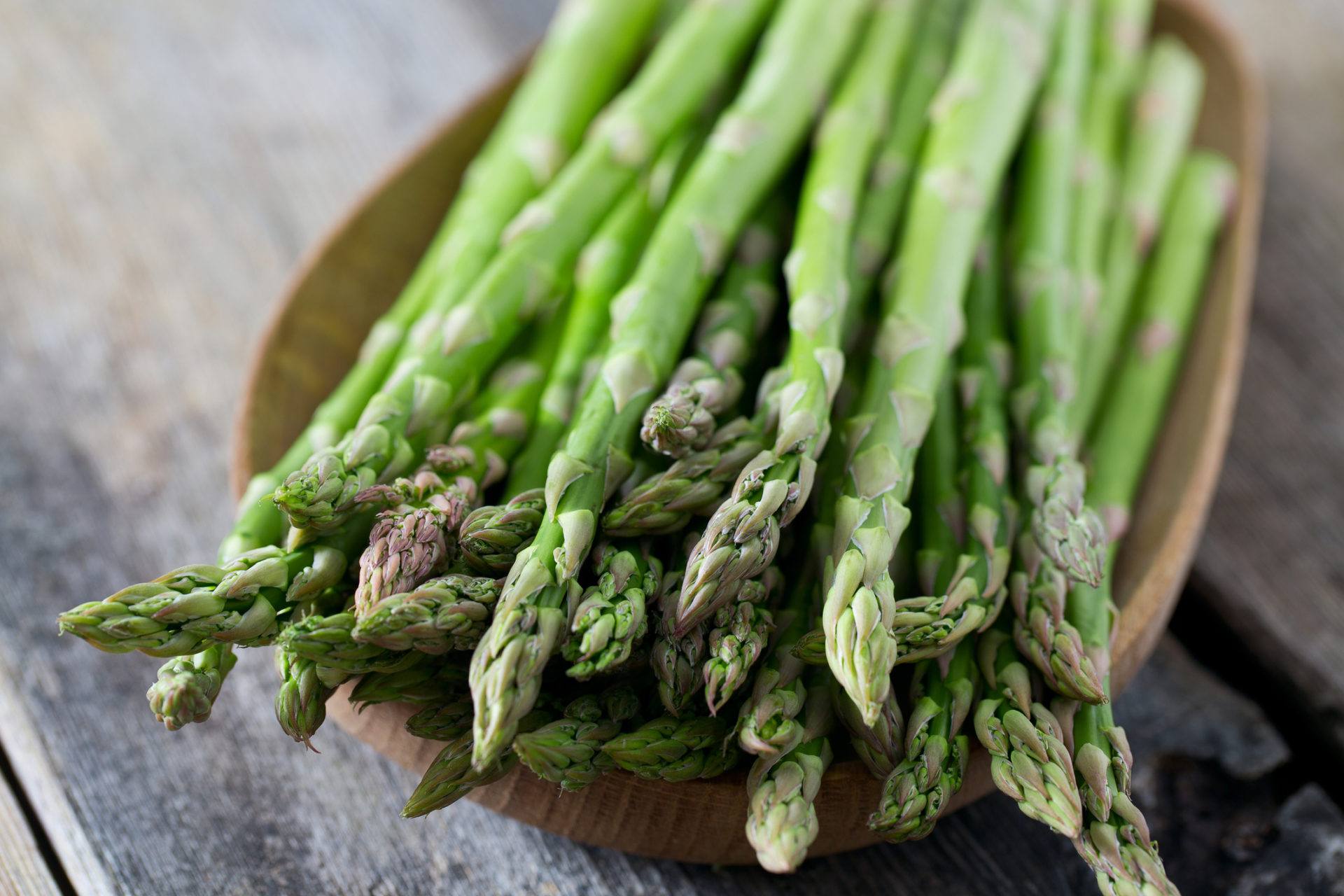Every Spring, we look forward to when our shelves are once again flooded with tender, flavorful stalks of organic Asparagus, and 2021 is shaping up to be another fine season! These delicacies of the vegetable world are wonderfully versatile, boasting a unique flavor that holds up to boiling, steaming, roasting, frying – you name it, it can be done with asparagus. While most of us are fully aware of how delicious asparagus can be, we’d be willing to bet that not many of us would really know much beyond that; as it turns out, there’s actually quite a lot to know. First off, they’re not actually a kind of grass, though they certainly look like it. Asparagus are members of the lily family, and it’s the first tender shoots that are harvested and consumed. They can be a bit tricky to cultivate, but once harvested, they come packed with a number of notable health benefits.
This week, it’s all about asparagus at Oliver’s, with organic asparagus for just $2.99 a pound and the info you need to become a real asparagus expert. We’ve got a lot to uncover, so let’s dig in!
On the Origins of Asparagus
Our love-affair with asparagus in the West started around 2,000 years ago, in the area along the eastern stretch of the Mediterranean. While they started as a wild plant, it wasn’t long before people began working to cultivate the tasty spears domestically. The ancient Greeks and Romans were two such societies and are known to have considered asparagus a delicacy, harvesting them fresh when they were in season and drying some for later use. The ancient Egyptians were also big asparagus fans, though they mostly grew them for their medicinal uses (more on that later). In medieval France, white asparagus became more highly prized than green for their elevated sweetness and supremely delicate flavor, though these only occur when the plant is grown in an environment devoid of sunlight. Nowadays, the two biggest asparagus producers are actually China and Peru, which just goes to show how far asparagus have managed to spread their stalks and just how much the world really loves them.
There are over 300 species of asparagus native to areas as far north as Siberia and as far south as South Africa, but the one most people will recognize are the common garden variety. Like we said before, the grass-like stems aren’t really grass at all – they’re actually the first shoots of what will eventually grow to be a large, fernlike bush. Asparagus plants will often take a year or even two years after being planted to produce enough of these prized shoots to harvest, but once they start, they can continue producing for a decade or more! Asparagus will also grow in soil that would be too sandy or have too much clay for other crops, and they thrive in the long winters that can spell disaster for less-rebellious vegetables. Unfortunately, asparagus do require a rest period each year, but while this means their productive season is relatively short – only about 12 weeks total – modern trade agreements mean you can now enjoy this seasonal treat year-round. Despite this, we still think the best asparagus are the ones grown as close to home as possible and right at the start of Spring!
The Care and Keeping of Your Asparagus
While most of us will devour our asparagus as soon as we bring it home, there are a few things to keep in mind if you’re planning on storing them for any length of time. First off, don’t store them for too long: fresh asparagus really only have a shelf-life of three to four days. To get the most out of every stalk, keep your asparagus cool and dry; if you have to wash them, do it gently and dry them thoroughly to prevent mold. Keep them from going limp by wrapping the base of an asparagus bundle in a moist cloth or paper towel, then place the whole bundle in a plastic bag. Alternatively, place your asparagus in wide-mouthed jar or glass with an inch of clean water – this will help keep your asparagus crisp right until the moment you use them!
Asparagus and You
Asparagus are very, very versatile and can prepared pretty much any way you can imagine – you can click HERE to check out some of our favorite asparagus creations! Though they may be best known for their myriad culinary applications, it turns out that asparagus are also jam-packed with health benefits. They’re a great source of soluble and insoluble fiber, and they’re low in calories, making them a superb option for those of us trying to shed a pound or two or trying to keep their hearts fighting-fit. Asparagus are also a huge source of vital nutrients and minerals, particularly folate which is crucial to cell development as well as maintaining steady energy levels and mood. It also makes asparagus a particularly good vegetable to eat while pregnant, as the high levels of folate are fantastic for healthy fetal development; of course, always check with your doctor first just to make sure. Folate is also to thank for asparagus’ reputation as an aphrodisiac, as it can help boost feelings of arousal and increase libido. Aside from folate, asparagus also comes with plenty of potassium, vitamin K, phosphorus, zinc, and even rare micro-nutrients like selenium!
Of course, we can’t talk about asparagus without at least mentioning asparagus pee and its, shall we say, distinctive smell. Along all the other helpful nutrients, asparagus contain high levels of the unique amino acid aspargine. This natural diuretic is what gives asparagus its stinky reputation, but in spite of the smell, this too can have surprising health benefits. It makes asparagus especially useful to women who are prone to urinary tract and bladder infections, as the increased rate of urination is thought to help prevent the infections from developing in the first place. There is also some evidence to suggest that consuming asparagus after drinking may have a positive effect on hangover symptoms, and its diuretic properties make it fantastic for shedding water weight and fighting bloat. Unfortunately, as it is with consuming any diuretic, too much can lead to dehydration, so make sure to enjoy your asparagus feast with a big glass of water!
Asparagus are as delicious as they are nutritious, and they’ve got the history to prove it. This week, spear yourself a deal with organic, California-grown asparagus for just $2.99 a pound. With hundreds of preparations and great prices from Oliver’s, there’s never been a better time to stalk up – check it out today!


No comments yet. Add the first comment